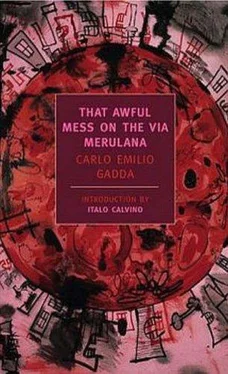And at last a little purse of twenty thousand lire to the same, listening (without seeming to) Don Corpi, along with an ivory crucifix on an ebony cross, "that he may assist me with his good prayers through the pain of Purgatory to the hope of Heaven, as in this Vale of Tears he has supported me with his paternal counsel and with the doctrine of Holy Mother Church."
"Here's a woman whose like you don't find often!" cried Doctor Fumi, striking two knuckles of his right hand on those poor papers, where the gentle hand of the murdered woman had moved (he was holding them in the meanwhile with his left).
All were silent. Balducci, in spite of those donations, seemed the first to have tears in his eyes. In reality, without going that far, he was showing that he, too, was convinced. The warm, the deductive sonority of the voice, of the phrasing, had persuaded them all: some to accept, some to surrender: as if gathering the aghast souls under the mantle of God's will. A handsome, male Neapolitan voice, when it surfaces from the limpid depths of deduction, like the candid nakedness of a siren from the marine milkiness in the Gajola {21}moonlight, is free completely and, in every clause, of that angrily assertive manner of certain northern beasts, and their married-scorched Führer: (in a bonfire of gasoline). It is pleasing, pleasing to our ears to abandon ourselves to such happy argumentation, like a cork conquered by the gentle current of a stream towards the valley, towards the call of the depths. The sonorous flow is but the symbol of the flow of logic: the source of Eleatic statement has been transformed into a moving course: boiling up in the disjunctions or dichotomies of the spirit or in the blind alternations of probabilities, it is perpetuated in a dramatically Heraclitean deflux πάνγα δε πόλεμος filled with urgencies, with curiosities, with desires, expectations, doubts, anguish, dialectic hopes. The listener becomes able to form opinions in any direction. The objection of the other side is pulverized in that musical voluptuousness, coagulates with a new nose, like the herm of Janus, when you stare it in the face, and then, immediately afterwards, from behind. All were silent.
At the reading of that text, or at hearing it read with such involvement, a text which, to tell the truth, was a little out of the ordinary, one would have believed that, at the moment she wrote her will, poor Liliana, prey to a kind of madness, or divinatory hallucination, already foresaw her end as imminent: if she hadn't positively been meditating suicide. The testament bore the date of January 12th, two months ago: her name-day, as her husband pointed out: a little after the Epiphany. It was "the unbosoming of an overexcited woman," someone opined tacitly. And the writing, too, to Balducci, Don Ciccio, Don Lorenzo, betrayed a certain jerkiness, a certain agitation: a graphologist would have earned the fee for his expertising. A strange ecstasy in this detachment from worldly things, and from their names and symbols: that voluptuousness of farewell which immediately distinguishes heroic minds as well as minds unwittingly suicidal: when one, not yet departed on the long journey, already finds himself with a foot at the water's edge, on the shores of darkness.
Ingravallo was thinking: he thought that even Christmas, that the Crib, the Epiphany. . with their children, their gifts, their Three Kings. . with that sunburst of golden rays under the Christ Child. . straw in the manger, light of the divine source. . could have concentrated, as in a mental storm-cloud, certain melancholy fixations of the signora: January 12th. The poor testatrix, at that moment, must not have had all her emotions under control. Damnit: and yet. . and yet she had maintained the provisions: she had changed nothing afterwards, in February, in March, not a syllable. Therefore, indeed, she had trusted the will to Don Corpi, urging him to "hide it and forget it."
An enigmatic expression: already clear to Don Ciccio, however: to forget it for the duration of her life, as if she wished to see buried, as soon as possible, that guilty list of possessions: which, only in the final loss of herself, she was permitted to scatter: which at every new day led her back towards the obligations, the inane reasons of living, while her soul tended already towards a kind of expatriation (her dear soul!) from the useless land towards maternal silences. The city and its people would know the future. She, Liliana. . Forgetful of markets and cries, with brief opal wings, in the sweet hour, when every farewell is necessary and every still-warm wall loses its color in the night, Hermes, appearing to her in his true being, would at last have looked towards the doors, with silent command: the doors through which one leaves, at last, as the populace continues talking, to go down, down, into a more pardonable vanity. "Evasi, effugi: spes et fortuna valete: nil mihi vobis-cum est: ludificate alios": at the Lateran museum, a sarcophagus: Liliana had remembered those words: she had asked him to translate them.
That giving, that donating, that sharing out among others! Ingravallo thought: operations, to his way of looking at things, so removed from the carnality and, in consequence, from the psyche of woman (a little woman, he thought of some, a little bourgeoise) which tends, on the contrary, to cash in: to elicit the gift: to accumulate: to save up for herself or for her children, black or white or chocolate brown: or at least to waste and to squander without giving to others, consuming like wastepaper hundred-lire banknotes in the cult of herself, of her own throat, her own nose, or lobes or lips, but never — and Don Ciccio became heated, in a kind of pre-established delirium — never, however, in honor of her rivals: and still less of rivals who were younger. That casting away, that dissipating like petals in the wind or like flowers in a floating stream, all the things that count most, that are most carefully locked up, sheets! contrary to the laws of the human heart which, if it gives, either gives in words or gives what is not its own; these ended by revealing to him, to Don Ciccio, the emotional state of the victim: the typical psychosis of the frustrated woman, the discontent, the woman humiliated in her soul: almost, indeed, a disassociation of a panic nature, a tendency to chaos: that is, a longing to begin all over again from the beginning: from the first Possible: "a return to the Indistinct." Since only the Indistinct, the Abyss, the Outer Darkness, can reopen a new spiritual ascent for the chain of determining causes: a renewed form, renewed fortune. For Liliana, it was true, the inhibitive powers of the Faith were still in force, and more the cohibitive ones: the formal proclamations of Doctrine: the symbol operated as light, as certitude. Radiated in the soul. Thus ruminated Ingravallo. The twelve lemmata had had the effect of channeling her psychoses towards the funnel of a holograph will, perfectly legal. The accounts of death were settled down to the last fraction of a cent. Beyond the confessor and the notary lay the limpid spaces of Mercy. Or, for others, the unknown liberty of not being, the eras of freedom.
The female personality — Ingravallo grumbled mentally, as if preaching to himself — what did it all mean?. . The female personality, typically gravity-centered on the ovaries, is distinguished from the male insofar as the very activity of the cortex, the old gray matter, of the female, is revealed in a comprehension, and in a revision, of the reasoning of the male element, if we can call it reasoning, or even in an echolalic re-edition of the words circulated by the man she has respected: by the professor, the commendatore, the gynecologist, the smart lawyer, or that slob over on the balcony of Palazzo Chigi. The woman's morality-personality turns for affective coagulations and condensations to the husband, or to whoever functions in his place, and from the lips of the idol takes the daily oracle of the understood admonition: for there isn't a man alive who doesn't feel he's Apollo in the Delphic sanctum. The eminently echolalic quality of her soul (The Council of Mainz, in 589, granted her a soul: by a majority of one vote) induces her to flutter gently around the axis of marriage: impressionable wax, she asks the seal of his imprint: for the husband, word and affection, ethos and pathos. Whence, that is to say, from the husband, the slow and heavy ripening, the painful descent of children. And when children are lacking, proclaimed Ingravallo, the fifty-eight-year-old husband declines, through no fault of his own, to the position of a good friend, a plaster idol, a pleasant ornament about the house, or chairman and general manager of the confederation of knickknacks, more image or dummy of husband; and man in general (in her unconscious perception) is degraded to puppet: an infertile animal, with a big, fake carnivalesque head. An implement that is of no use: a gimlet with its threads worn out.
Читать дальше












